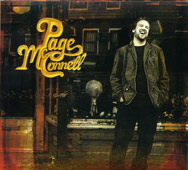Page McConnell
Page McConnell
(Legacy)
After
the long career of Phish came to its definitive close (not once, but twice),
their excellent keyboard player, Page McConnell, was faced with the usual
problem: What to do now that he was a grown-up? His instrumental bravura
is, of course, a given (he's one of the few players working today who are
able to play both "classic" and "modern" instruments
very well, regardless of "style"); plus, with Phish he had been
a nice singer. There was a problem, though: his productivity as a composer
had never been something to shout about; hence, the fact that quite a few
writers expressed their uncertainty about his viability as a solo artist
supposed to be about to release a solo album.
Those
doubtful writers had totally forgotten about the first album by Vida Blue.
Released in 2002, after Phish broke-up for the first time, the album had
not been greeted with much attention. Which was in some ways understandable,
given the fact that the highly exuberant and very prolific Trey Anastasio
was considered as the real torch-bearer of his (former) group. Though the
attention he received was just a fraction of the one given to Phish (in
a somewhat similar way to the David Gilmour/Pink Floyd usual ratio), Anastasio
did his best in a very unstable musical dimension. What about Vida Blue?
I
really don't know how this came into being, but McConnell started playing
with two excellent musicians who - very important, this - had a very different
musical approach than the one adopted by the rhythm section in Phish: Russell
Batiste was the drummer in the Funky Meters, while Oteil Burbridge (the
sticker on the CD obviously introducing him as a member of the Allman Brothers)
had played in a lot of different situations (he's also on Surrender To
The Air, the collective album released under Trey Anastasio's name in 1996).
On an album featuring instrumental jams and songs, pushed by a funky rhythm
section that's strong but also elastic and perfectly capable of playing
with finesse at the same time, McConnell found new life in those trusted
Fender Rhodes electric piano and Hohner Clavinet, coupled with a nice and
intelligent performance on synth (if I'm not mistaken, an Andromeda by
Alesis). The whole was not too far from Phish in their "space jam" mode,
but here everything sounded fresh and "modern" all the same;
also a few nice songs.
I'm
quite sorry I have to say that those who were skeptical were right. I don't
know what happened, so I can only guess: maybe the fact of having signed
a new record contract, the perception that "now's for real",
the impulse to be different from Phish but not too much, and too much studio
work on his own (owning a personal studio proving to be a double-edged
sword one more time) made some qualities appear that are not necessarily
among McConnell's best. Details will follow in a minute, but I'll anticipate
that the choice of musicians was not the best, given the results one can
hear.
What
is gonna happen now? McConnell is on tour in the United States, with a
line-up featuring Adam Zimmon on guitar (on the album he plays competently
but without much personality), Jared Slomoff on guitar, vocals and keyboards
(a former technical collaborator of Mike Gordon, he co-produced the album),
a bass player whose name I don't know, and Gabe Jarrett (Keith's son) on
drums. As it's to be expected for this kind of music, those concerts will
tighten the material, making it better. But provided things will turn out
for the best, the final result will be Phish, but not so fresh. Will it
be worth it? We'll see.
Working
on his own, McConnell has created a large keyboard canvas where (in so
differently from Vida Blue, but just like Phish) piano and Hammond organ
are to the fore; the end result shows many traces of synthetic bass and
drum parts of great intelligence and quality. Maybe because he wanted to
sound different from Phish, here McConnell featured not much guitar (Anastasio
plays on just one track, and he's quite subdued, and impossible to recognize).
On some tracks, Mike Gordon plays bass, and Jon Fishman drums - but not
on the same tracks. A perverse choice, good Jim Keltner sounds absolutely
out of place, especially so when he plays as a team with Gordon (their
ideas about where to place accents could not be more different).
Beauty
Of A Broken Heart is a nice opener, and Heavy Rotation is not bad, offering,
starting at about 4' (after an edit that sounds really brutal), a jam with
a nice piano and the absurd rhythms of the couple Keltner/Gordon. Maid
Marian is maybe the best song here, reminding this listener of Elton John
circa Tumbleweed Connection (an album that was very influenced by American
music - for instance, The Band - and which proved to be an influence itself
on a lot of American music - for instance, Bruce Hornsby and Ben Folds),
with a nice bridge. Close To Home is nothing special.
We
have a nice track, Runaway Bride, while the jam in Back In The Basement
has a good piano and the Keltner/Gordon rhythm section.
Sounding
quite "classic rock", Rules I Don't Know is nice. Complex Wind
is the other very good track, with a synth playing flute and vibes parts,
and a nice melody. Everyone But Me is a nice good-bye.
Beppe Colli
© Beppe Colli 2007
CloudsandClocks.net | May 15, 2007











